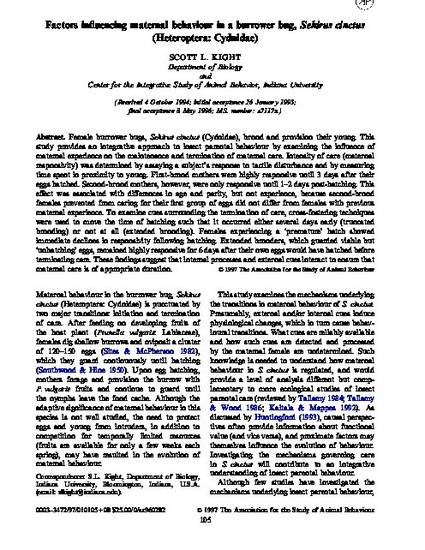
Article
Factors influencing maternal behaviour in a burrower bug, Sehirus cinctus (Heteroptera: Cydnidae)
Animal Behaviour
(1997)
Abstract
Female burrower bugs, Sehirus cinctus (Cydnidae), brood and provision their young. This study provides an integrative approach to insect parental behaviour by examining the influence of maternal experience on the maintenance and termination of maternal care. Intensity of care (maternal responsivity) was determined by assaying a subject’s response to tactile disturbance and by measuring time spent in proximity to young. First-brood mothers were highly responsive until 3 days after their eggs hatched. Second-brood mothers, however, were only responsive until 1–2 days post-hatching. This effect was associated with differences in age and parity, but not experience, because second-brood females prevented from caring for their first group of eggs did not differ from females with previous maternal experience. To examine cues surrounding the termination of care, cross-fostering techniques were used to move the time of hatching such that it occurred either several days early (truncated brooding) or not at all (extended brooding). Females experiencing a ‘premature’ hatch showed immediate declines in responsivity following hatching. Extended brooders, which guarded viable but ‘unhatching’ eggs, remained highly responsive for 6 days after their own eggs would have hatched before terminating care. These findings suggest that internal processes and external cues interact to ensure that maternal care is of appropriate duration.
Keywords
- sehirus cinctus,
- cydnidae,
- parental behavior,
- insect parental care,
- maternal behavior
Disciplines
Publication Date
1997
Citation Information
Scott Kight. "Factors influencing maternal behaviour in a burrower bug, Sehirus cinctus (Heteroptera: Cydnidae)" Animal Behaviour Vol. 53 (1997) p. 105 - 112 Available at: http://works.bepress.com/scott-kight/22/
